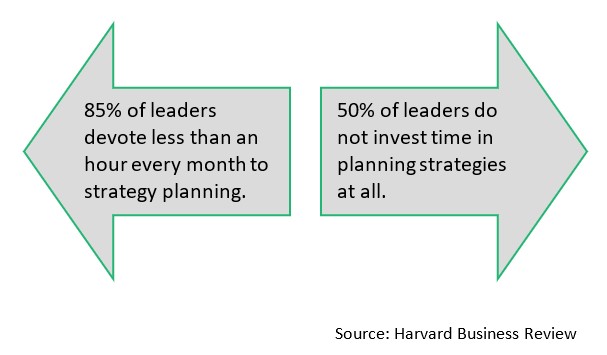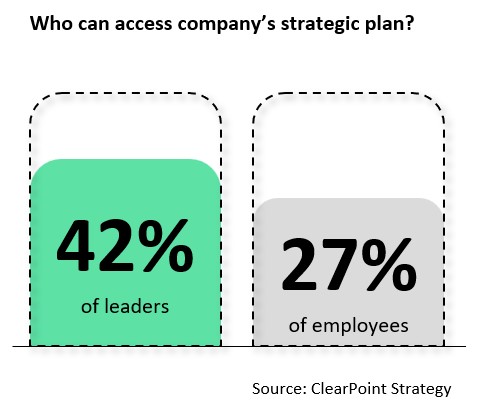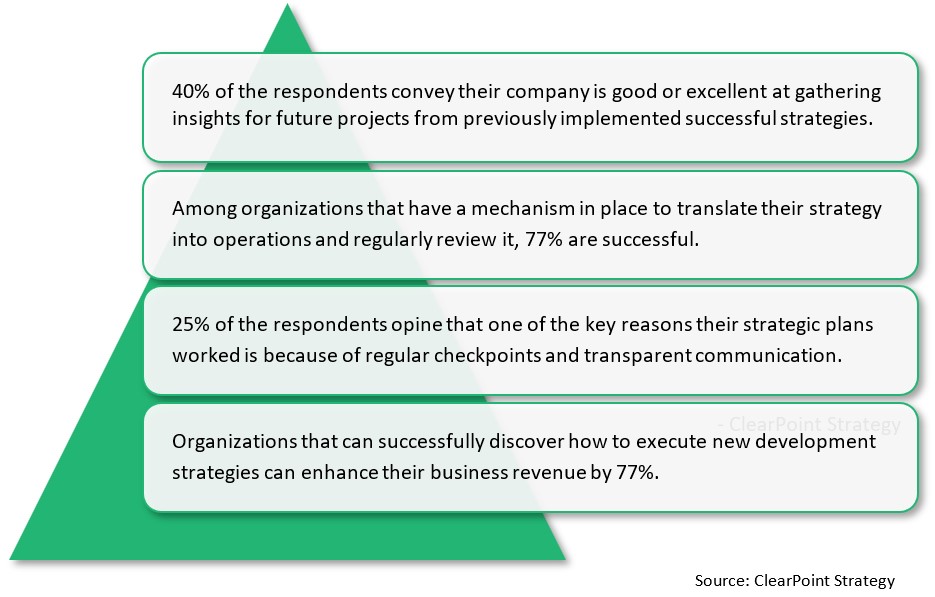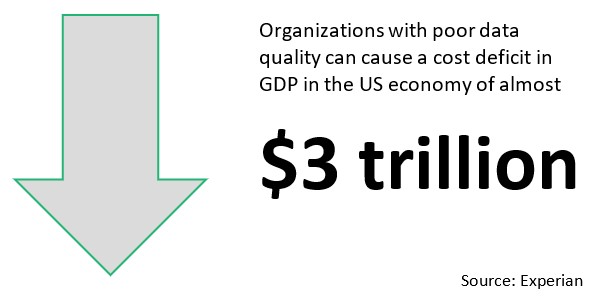
Businesses today are faced with both unprecedented opportunities and unforeseen challenges. As you navigate through this landscape of rapid technological advancements and ever-changing consumer demands, one thing becomes abundantly clear: operational strategy is the bedrock upon which successful organizations are built. Without a coherent and well-executed strategy, businesses risk falling prey to the disruptive forces that can shake the very foundation of their existence.
The Perils of Neglecting Operational Strategy
 In the business world, a coherent operational strategy guides you through uncharted waters. However, ignoring this critical aspect can lead to dire consequences. According to Harvard Business Review, 60% to 90% of strategic operation plans never fully launch. One of the primary reasons behind such a staggering failure rate is the absence of a robust operational strategy. Surprisingly, 85% of business leaders devote less than an hour every month to strategy planning and 50% do not invest time at all.
In the business world, a coherent operational strategy guides you through uncharted waters. However, ignoring this critical aspect can lead to dire consequences. According to Harvard Business Review, 60% to 90% of strategic operation plans never fully launch. One of the primary reasons behind such a staggering failure rate is the absence of a robust operational strategy. Surprisingly, 85% of business leaders devote less than an hour every month to strategy planning and 50% do not invest time at all.
Unraveling the Link Between Strategy and Execution
It is not enough to merely have a well-defined answer to what an operation strategy is; the key lies in executing it flawlessly. Strategy execution is often overlooked despite its critical importance. How many times have you witnessed grand plans fall flat due to poor execution? A disconnect between strategy and execution can doom even the most promising project initiatives.
Operational Strategy Problems: Unveiling the Culprits
When organizations do not analyze what operations strategy is, they set themselves up for a series of challenges that can put their very survival at stake. Let us delve into some of the common problems that arise from a lack of focus on operational strategy:
- Inefficiency and Waste - Without a clear roadmap, you may find your organization grappling with inefficiencies and waste and a poor understanding of what operational strategies are. Resources may be misallocated, and project productivity may suffer, leading to increased project costs and decreased profitability.
- Ineffective Risk Management - Operational strategy goes hand in hand with risk management. Failure to identify potential risks and develop mitigation plans can expose your company to a myriad of threats that can cripple your operations.

- Data Quality Woes - Data is the lifeblood of modern organizations, but poor data quality can lead to disastrous outcomes. According to a ClearPoint Strategy study, only 27% of the workforce and 42% of leaders can access their company’s strategic plan, emphasizing the significance of robust data management practices.
- Business Continuity Concern - Disasters strike when least expected, and you must be prepared to weather the storm. Surprisingly, many organizations neglect business continuity planning, leaving them vulnerable to disruptions that can be catastrophic for their survival.
Embracing Change: Leveraging Emerging Technologies
If the digital era has taught us anything, it is that change is the only constant. To thrive in this dynamic landscape, you must embrace emerging technologies and integrate them into your operation strategy definition. One such field that holds immense promise is predictive intelligence or AI-based solutions.
Predictive intelligence and AI-driven tools can act as a crystal ball for your organization, providing you with early warning signs of impending project risks. By leveraging data and algorithms, you can forecast potential obstacles and take proactive measures to avoid them. This improves the chances of project success and enhances overall business operation strategy.
Statistics Don't Lie: The Power of Data
The following insights explain how data enables operational strategy implementation:

The Way Forward: Integrating Predictive Intelligence into Operational Strategy
As you rethink what is operational strategy and how it safeguards your organization from disruptions, it becomes evident that embracing predictive intelligence is not an option but a necessity. How can you effectively integrate these technologies into your operation strategy definition? Here are some actionable steps:
- Identify Critical Decision Points - Analyze your business processes and identify key decision points where emerging technologies can play a pivotal role. Whether it is in project leadership or customer behavior analysis, pinpointing these critical areas will enable you to make informed choices in revisiting the definition of operation strategy.
- Invest in Data Quality - Remember, if you feed inadequate or irrelevant data, you will get inaccurate results. The success of predictive intelligence tools hinges on the quality of the data they are fed. Invest in data quality initiatives to ensure that the operating strategy insights you draw are accurate and reliable.
- Foster a Data-Driven Culture - A data-driven culture is a prerequisite for the successful adoption of emerging technologies. Encourage your project teams to rely on data and insights rather than impulses when making project decisions. Foster an environment that values data-driven approaches in strategy operations.
- Leverage Expertise - Implementing AI-based tools may require specialized knowledge and skills. Consider partnering with experts in the field or investing in employee training to maximize the potential of these technologies and analyze how they fit into your organization’s operations strategy definition.
- Continuously Evaluate and Adapt - The digital era is a constantly evolving landscape. Continuously evaluate the efficacy of your predictive intelligence initiatives in your strategy operations and be prepared to adapt to changing circumstances.
Conclusion
Organizations that ignore revamping their operational strategy definition do so at their peril. The consequences of neglecting this critical aspect can be critical, leading to inefficiency, increased risk exposure, and compromised business strategy and operation. Organizations with poor data quality can cause almost a $3 trillion cost deficit in GDP in the US economy, according to an Experian report. However, by embracing emerging technologies like predictive intelligence and AI-based solutions, you can fortify your operations strategies, anticipate challenges, and position your organization for success in this dynamic landscape.
Remember, the power to shape your organization's destiny lies in your hands. Will you choose to ignore operation strategies and invite disruption or harness the potential of predictive intelligence to secure a brighter future for your business? The choice is yours. Act wisely and thrive in the innovation era.
TrueProject, a cutting-edge predictive intelligence tool, revolutionizes operational strategy by harnessing the collective wisdom of stakeholders through surveys and assessments. By collating valuable data and feedback from various team members and stakeholders, TrueProject creates a comprehensive and real-time understanding of project dynamics and business operational strategies. Armed with this wealth of insights, business leaders gain the power of proactive decision-making, enabling them to optimize project delivery and streamline business operational strategic processes. The solution's ability to identify potential bottlenecks, risks, and opportunities empowers you to take timely actions, minimizing disruptions and maximizing efficiency. In this era of rapid change, TrueProject equips you with the foresight needed to stay ahead of the curve, fostering a culture of innovation and continuous improvement that leads to long-term success and growth.
More information on TrueProject can be found at: TrueProjectInsight.com

About the Author: Serving as the CEO at TrueProject, Tom Villani plays a major role in shaping the company's strategic direction, driving growth, and fostering a culture of innovation. Prior to his role at TrueProject, Tom worked as the Senior Vice President, Digital Innovation of CAI, Vice President of Global Alliances and Partners at Hitachi Vantara, and key senior executive roles with Information Builders, MicroStrategy and AT&T. Tom also serves in advisory board capacities in the areas of Big Data and IoT.
Endnotes
- Benjamin, Tia. “Operational Strategy Problems.” Chron. https://smallbusiness.chron.com/six-barriers-effective-planning-45281.html
- Flood, Phylicia. “The consequences of poor data quality for a business.” Experian, January 24, 2023. https://www.edq.com/blog/the-consequences-of-poor-data-quality-for-a-business/
- Hall, Bill. “Strategy Execution Is Critical Yet Often Ignored.” Forbes, July 28, 2021. https://www.forbes.com/sites/forbescoachescouncil/2021/07/28/strategy-execution-is-critical-yet-often-ignored/
- Jackson, Ted. “50+ Eye-Opening Strategic Planning Statistics [2022].” ClearPoint Strategy, April 14, 2023. https://www.clearpointstrategy.com/blog/strategic-planning-statistics
- Mohsin, Maryam. “10 SMALL BUSINESS STATISTICS YOU NEED TO KNOW FOR 2023.” Oberlo, January 28, 2023. https://www.oberlo.com/blog/small-business-statistics
- Olson, Andrea Belk. “4 Common Reasons Strategies Fail.” Harvard Business Review, June 24, 2022. https://hbr.org/2022/06/4-common-reasons-strategies-fail
- Root III, George N. “What Happens When an Organization Has No Coherent Strategy?” Chron, January 14, 2019. https://smallbusiness.chron.com/happens-organization-coherent-strategy-20289.html
- Shulmistra, Dale. “23 Business Continuity Statistics You Need to Know.” Invenio IT, July 14, 2023. https://invenioit.com/continuity/business-continuity-statistics/





